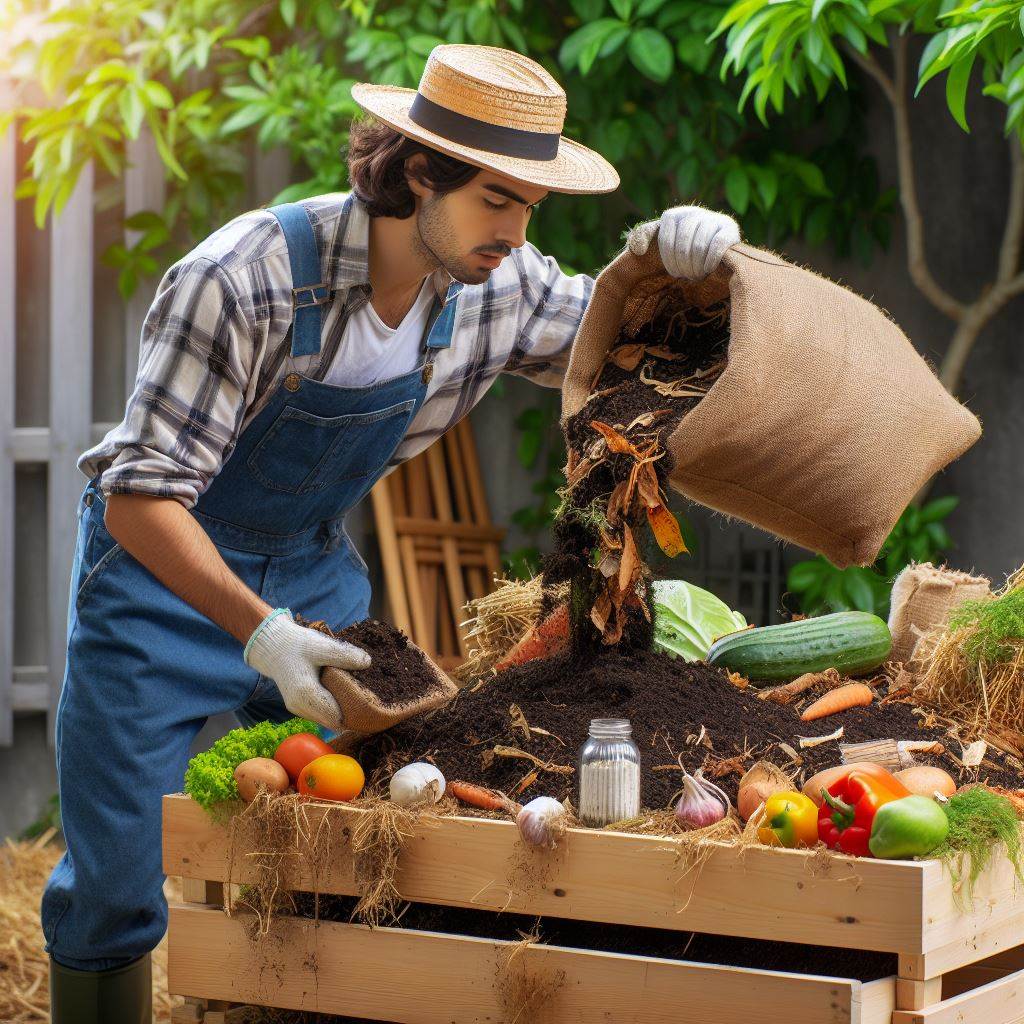Introduction
Compost teas are a natural way to enhance plant health, using beneficial microbes found in compost.
Boosting plant health naturally is vital for sustainable agriculture and gardening practices.
The concept of compost teas
Compost teas are liquid extracts made by steeping compost in water, allowing beneficial microorganisms to multiply.
These teas can be applied to plants’ roots or sprayed on leaves.
The importance of boosting plant health naturally
Promoting plant health naturally reduces reliance on chemical fertilizers and pesticides, protecting the environment and human health.
It also enhances soil fertility and plant resilience.
Grabbing the reader’s attention with an interesting fact or anecdote related to compost teas
Did you know that compost teas have been used since ancient times?
The Babylonians brewed teas to fortify their crops, leading to bountiful harvests even in unforgiving conditions.
By incorporating compost teas into our gardening practices, we can harness the power of nature to nourish and protect our plants.
Stay tuned for more information on the benefits and techniques of using compost teas!
What are Compost Teas
Compost teas are liquid fertilizers made by steeping compost in water along with additional additives.
They are used to enhance plant health naturally, providing a range of benefits.
Define compost teas and their purpose
Compost teas are nutrient-rich solutions created by brewing compost in water, which helps extract beneficial microorganisms, nutrients, and enzymes from the compost.
Their purpose is to improve plant growth and overall vitality.
The ingredients used to make compost teas
- Compost: The main ingredient, compost provides the organic matter required for the brewing process. It is a mixture of decomposed plant material, animal manure, and other organic waste.
- Water: An essential component, water acts as a medium to extract nutrients and microorganisms from the compost and aids in the multiplication of beneficial bacteria and fungi.
- Additional additives: Some compost teas may include extras like molasses, kelp, fish emulsion, or rock dust to further enrich the solution.
The different types of compost teas
- Aerated compost tea (ACT): This type of compost tea is brewed with aeration using an air pump, adding oxygen to the solution. It enhances the growth of aerobic microorganisms.
- Non-aerated compost tea: Also known as basic compost tea, it is made by steeping compost in water without the use of an air pump. This method favors the development of anaerobic microorganisms.
Benefits of Compost Teas
- Increased nutrient availability: Compost teas help release nutrients present in the compost, making them more readily available for plant uptake.
- Suppression of plant diseases: Beneficial microorganisms found in compost teas, such as bacteria and fungi, can help prevent or combat plant diseases by competing with harmful pathogens.
- Improved soil structure: Compost teas contain organic matter that enhances soil structure, making it more suitable for root development and water retention.
- Enhanced plant growth: The nutrient-rich composition of compost teas promotes healthy plant growth, resulting in better yields and stronger, more resilient plants.
- Increased soil biodiversity: By introducing a diverse array of microorganisms into the soil through compost teas, it boosts overall soil ecosystem health and diversity.
- Reduced reliance on chemical fertilizers: Compost teas offer a natural alternative to synthetic fertilizers, reducing the need for chemical inputs and minimizing environmental impact.
Tips for Using Compost Teas
- Dilute before application: Compost teas should be diluted with water to avoid overwhelming plant roots or causing nutrient imbalances.
- Apply when soil is moist: Apply compost teas when the soil is already moist to allow better absorption and to maximize the benefits.
- Use as a foliar spray: Compost teas can be sprayed directly onto plant leaves to provide nutrients and beneficial microorganisms, enhancing plant defense against pests and diseases.
- Regular application: Apply compost teas periodically throughout the growing season to maintain nutrient levels and promote ongoing plant health.
In fact, compost teas offer an organic and sustainable solution for enhancing plant health naturally.
By harnessing the power of beneficial microorganisms and nutrients, these teas provide numerous benefits for both plants and the environment.
Incorporating compost teas into your gardening routine can lead to healthier, more productive plants while reducing reliance on chemical fertilizers.
Read: Raised Bed Gardening: Tools & Tips
Benefits of Compost Teas
Compost teas, a natural and organic solution for boosting plant health, offer numerous benefits to gardeners and farmers alike.
These liquid extracts, made by steeping compost in water, have proven to be incredibly beneficial in enhancing soil structure, fertility, and promoting beneficial microbial activity.
Improvement of Soil Structure and Fertility
Compost teas play a pivotal role in improving soil structure and fertility.
When applied to the soil, they act as a natural soil conditioner, enhancing the soil’s ability to hold moisture and nutrients.
By increasing the soil’s water-holding capacity and preventing erosion, compost teas ensure plants receive the necessary water and minerals for healthy growth.
Furthermore, compost teas are known to improve soil fertility.
The microorganisms present in the tea help break down organic matter, releasing valuable nutrients into the soil.
This nutrient-rich environment encourages robust plant growth and minimizes the need for chemical fertilizers.
Promotion of Beneficial Microbial Activity
Compost teas are teeming with beneficial microorganisms that play a crucial role in the soil ecosystem.
These microorganisms, such as bacteria, fungi, and protozoa, help decompose organic matter and make nutrients more accessible to plants.
When compost tea is added to the soil, it inoculates it with a diverse microbial community, enhancing its overall health and productivity.
These microorganisms also suppress harmful pathogens, creating a balanced and disease-resistant soil environment.
Transform Your Agribusiness
Unlock your farm's potential with expert advice tailored to your needs. Get actionable steps that drive real results.
Get StartedPositive Impact on Nutrient Uptake and Pest Management
Compost teas have a positive impact on nutrient uptake and pest management.
The microorganisms and enzymes present in the teas break down organic matter, making nutrients more easily available to plant roots.
This boosts nutrient uptake, leading to healthier and more vibrant plants.
Additionally, compost teas act as a natural pest management tool.
The beneficial microorganisms in the tea actively compete with harmful pests and pathogens, reducing their population and preventing damage to plants.
This natural pest control method is safe for the environment and eliminates the need for chemical interventions.
Supporting Evidence from Anecdotal and Scientific Studies
The benefits of compost teas are supported by both anecdotal evidence and scientific studies.
Gardeners and farmers have reported improved plant growth, disease resistance, and overall soil health after incorporating compost teas into their practices.
Scientific studies have also shown promising results.
A study published in the Journal of Agricultural and Food Chemistry found that plants treated with compost teas had increased nutrient absorption, leading to higher crop yields.
Another study published in the Applied Soil Ecology journal demonstrated that the application of compost teas significantly reduced disease incidence in plants.
With such compelling evidence supporting their benefits, it’s no wonder that compost teas have become increasingly popular among gardeners and farmers seeking natural and sustainable solutions for plant health.
In general, compost teas offer a multitude of benefits, including improved soil structure and fertility, promotion of beneficial microbial activity, enhanced nutrient uptake, and natural pest management.
Supported by anecdotal evidence and scientific studies, compost teas have proven to be a valuable tool in boosting plant health naturally.
Read: Automated Tools for Modern Gardeners

How to Make Compost Teas
Step-by-Step Instructions for Making Aerated Compost Tea
- Gather the necessary materials and equipment, including a container, compost, air pump, and strainer.
- Fill the container with water, leaving enough space for the compost.
- Add the compost to the container, ensuring a ratio of 1 part compost to 4 parts water.
- Attach the air pump to the container, ensuring it is submerged in the water.
- Turn on the air pump to create aeration in the tea, promoting the growth of beneficial microorganisms.
- Allow the compost tea to brew for 24-48 hours, maintaining a temperature of 60-70°F.
- After the brewing period, use the strainer to remove any solid particles from the tea.
- The aerated compost tea is now ready to be used as a natural plant health booster!
Alternative Methods for Making Non-Aerated Compost Teas
- Fill a container with water, leaving enough space for the compost.
- Add the compost to the container, ensuring a ratio of 1 part compost to 4 parts water.
- Let the compost steep in the water for 3-4 days to extract the nutrients.
- Stir the mixture occasionally to promote the extraction process.
- After the steeping period, strain the tea to separate the liquid from the solid compost.
- The non-aerated compost tea is now ready to be applied to plants for natural nourishment.
Best Practices for Using Compost Teas
- Aerated compost tea is best applied within 4-6 hours after brewing to maximize its effectiveness.
- Non-aerated compost tea can be stored for up to a week in a cool, dark place.
- Apply compost tea to plants by spraying or watering around their base, ensuring thorough coverage.
- Use a fine-mesh strainer to prevent clogging of sprayers or watering cans when applying compost tea.
- Apply compost tea early in the morning or late in the evening to avoid evaporation and maximize absorption.
- Regularly monitor plants’ response to compost tea and adjust the frequency of application accordingly.
- Do not use compost teas that emit foul odors or appear slimy, as they may contain harmful pathogens.
In summary, compost teas are an excellent natural solution for boosting plant health.
Whether you opt for aerated or non-aerated methods, the brewing process is simple and can be done with easily accessible materials.
By incorporating compost teas into your gardening routine, you can enhance the nutrient content of the soil and promote the growth of beneficial microorganisms, leading to healthier and thriving plants.
Read: Composting Basics for Richer Soil
Application and Usage of Compost Teas
The various ways compost teas can be used in the garden or on the farm
- Foliar application for disease prevention and nutrient delivery.
- Soil drench to enhance root development and improve overall plant health.
The recommended dilution rates for different applications
When using compost teas, it is essential to follow proper dilution rates to achieve the best results.
Dilution rates may vary depending on the specific needs of your plants and the type of compost tea being used.
Here are some general guidelines:
- For foliar application, a 10:1 dilution ratio is commonly recommended. This means mixing 10 parts water with 1 part compost tea.
- For soil drench, a stronger solution may be used. A 5:1 dilution ratio, or even undiluted compost tea, can be applied directly to the soil.
Remember to always test a small area before applying compost tea extensively to ensure compatibility with your plants.
Examples or case studies of successful compost tea applications
Example 1
A vegetable farmer in California experienced a significant decrease in foliar diseases after regularly applying compost tea through foliar spray.
By diluting the compost tea at a 10:1 ratio and applying it every two weeks, the farmer observed healthier and disease-resistant plants.
Example 2
A flower gardener in Massachusetts enhanced the overall plant health of their perennial garden by utilizing compost tea as a soil drench.
They directly applied undiluted compost tea around the base of their plants and witnessed increased flower production and vibrant foliage.
Example 3
A vineyard owner in France improved root development in their grapevines by drenching the soil with a 5:1 diluted compost tea.
This practice not only resulted in stronger, healthier vines but also contributed to better fruit quality and taste.
These examples showcase the effectiveness of compost tea in promoting plant health and addressing specific issues.
However, it’s important to note that results may vary depending on factors such as soil composition, plant species, and local climate.
In short, compost teas offer a versatile and natural solution for boosting plant health.
Whether you choose to utilize foliar application or soil drench, understanding the recommended dilution rates and learning from successful applications can help maximize the benefits of compost teas in your garden or farm.
Read: Sustainable Farming Tools & Practices
Learn More: Top 10 Must-Have Garden Tools for Beginners
Tips for Maximizing the Efficiency of Compost Teas
Compost teas are an excellent natural solution to boost the health and vitality of plants.
By harnessing the power of beneficial microorganisms in compost, these teas provide a concentrated dose of essential nutrients and beneficial microbes to the soil and plants.
The need for high-quality compost as the base material
To maximize the efficiency of compost teas, there are several tips and techniques that can be implemented.
These include emphasizing the need for high-quality compost as the base material, utilizing organic additives to enhance microbial activity, ensuring proper aeration and temperature control during the brewing process, and regularly testing the compost teas for optimal nutrient content.
High-quality compost is the foundation for a successful compost tea.
It should consist of a varied blend of organic materials, including kitchen scraps, yard debris, and animal manure.
This ensures a well-balanced nutrient profile, providing plants with the essential elements they need to thrive.
Suggest using organic additives like molasses or kelp to enhance microbial activity
Besides top-notch compost, organic supplements can boost microbial activity within the compost tea.
Adding small amounts of molasses or kelp can stimulate the growth and activity of beneficial microorganisms, further enriching the tea with nutrients and improving soil health.
The importance of proper aeration and temperature control during the brewing process
Proper aeration and temperature control are critical during the brewing process to ensure the growth and activity of beneficial microorganisms.
Aeration provides oxygen for microorganisms, enhancing their growth and reproduction.
Temperature control helps maintain optimal microbial activity, as different microorganisms thrive at specific temperature ranges.
Encourage regular testing of compost teas to ensure optimal nutrient content
Regular testing of compost teas is essential to ensure optimal nutrient content.
Nutrient levels can vary depending on the compost used and brewing conditions.
Testing enables modifications, like incorporating extra amendments, to attain the targeted nutrient balance tailored to specific plant requirements.
Showcase Your Farming Business
Publish your professional farming services profile on our blog for a one-time fee of $200 and reach a dedicated audience of farmers and agribusiness owners.
Publish Your ProfileBy following these tips, gardeners and farmers can maximize the efficiency of compost teas and unlock the full potential of their plants.
Compost teas not only provide an organic alternative to synthetic fertilizers but also improve soil health and promote sustainable gardening practices.
Incorporating compost teas into gardening routines can lead to healthier plants, increased yields, and overall improved vitality in the garden.
Conclusion
Compost teas offer numerous benefits for boosting plant health naturally.
They enhance nutrient uptake, promote beneficial microbial activity, and suppress harmful pathogens.
By following simple steps, anyone can make and use compost teas effectively.
It is important to experiment and share experiences with compost teas to learn and improve their efficacy.
The more we explore and understand compost teas, the better we can utilize them for greener and healthier gardens.
For those interested in further reading on compost teas, here are some additional resources and references:
- “Teaming with Microbes: The Organic Gardener’s Guide to the Soil Food Web” by Jeff Lowenfels and Wayne Lewis.
- “The Compost Tea Brewing Manual” by Elaine Ingham.
- The website of the United States Composting Council provides valuable information and resources on composting techniques.
- The International Biochar Initiative offers insights on the use of biochar in compost tea production.
Remember, by harnessing the power of compost teas, we can nurture our plants naturally while reducing the need for chemical interventions.
Happy gardening!




